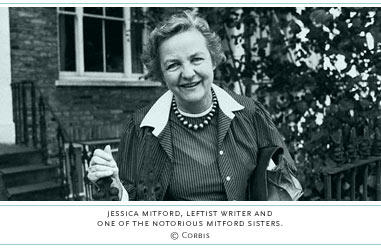 My interest in the Mitford sisters has waxed and waned over the years. Every couple of years I find myself thinking, I should read that book by Nancy, or that biography of Unity, or that book of journalism by Jessica.
My interest in the Mitford sisters has waxed and waned over the years. Every couple of years I find myself thinking, I should read that book by Nancy, or that biography of Unity, or that book of journalism by Jessica.I loved Nancy’s witty novels and her biography of Madame de Pompadour. A couple of years ago I read a biography of all six Mitford sisters, and at the time I promised myself I would get around to reading some of Jessica’s books, most notably her famous study of the funeral trade, The American Way of Death. Hons and Rebels is a memoir of her early years, most notably detailing her marriage (tragically cut short) to Esmond Romilly.
If you want a study of political extremes in the one family, here you have it in spades. Her parents (Muv and Farv, in Mitford argot) seemed like stodgy, xenophobic conservatives, with their own ingrained way of thinking. For example, Muv (mother) would not allow her girls to take any type of medicine when sick, thinking that good, healthy bodies could look after themselves.
Growing up, Jessica turned to socialism. She read early on of the horrors happening to the Jews under Hitler, and became an implacable opponent to his regime. (Indeed, at one stage she considered assassinating him, something within the realm of possiblity.) Her sisters, Diana and Unity, became involved in fascism. Diana married Sir Oswald Mosley, leader of the British fascists. Meanwhile Unity became obsessed with Hitler, and determined to meet him, a feat she amazingly achieved. She packed her bags and went to Germany, and started hanging out at Hitler’s favourite haunts. After noticing Unity constantly turning up wherever he was, Hitler asked her over to his table. Thus Unity became a part of Hitler’s group. Not only that, the Mitford parents became ‘charmed’ by Hitler and met the Fuhrer on several occasions. This is why Jessica thought she could very reasonably have gained access to Hitler and assassinated him, although she knew if she had tried she would have been killed instantly. Later she bitterly lamented what she felt was cowardice, sure she could have changed the direction of history.
To illustrate how deep these political divisions pulled the sisters apart, Jessica describes street scenes of her marching with the Communists, whilst Diana and Unity would be marching with the Fascists, Jessica defiantly waving a fist at them! Things would come to a head for Unity when war finally broke out between England and Germany. How could she support Germany attacking her own country? In order to deal with this problem, she shot herself in the head. Amazingly, she survived, but was never the same girl again.
Jessica’s descriptions of Unity are fascinating. Despite all their differences, she claimed Unity was her favourite sister. Here is Jessica Mitford on Unity:
‘I pondered over the unsolvable riddle: why had she, to those of us who knew her the most human of people, turned her back on humanity and allied herself with those grinning beasts and their armies of robot goose-steppers?…How could Boud (Unity), a person of enormous natural taste, an artist and poet from childhood, have embraced their crude philistinism? She had been eccentric all her life, completely outside the bounds of normal behaviour, uncontrollable by governesses, parents and the headmistress of her boarding school (who had diplomatically informed my mother that, since many girls leave school at sixteen, she saw no reason why Unity shouldn’t be one of them); yet she had enthusiastically adopted the most deadeningly conformist of all philosophies. She was always a terrific hater – so were all of us, except possibly Tom – but I had always thought that she hated intelligently, and admired her ability to reduce the more unpleasant of the grown-up relations to a state of acute nervous discomfort with one of her smouldering looks of loathing. But when she wrote gaily off to Der Sturmer, "I want everybody to know that I am a Jew hater", I felt she had forgotten the whole point of hating, and had once and for all put herself on the side of the hateful.’
I also enjoyed some of the descriptions of Nancy Mitford, writing her novels in her room, laughing out loud all day as she lampooned her family. I don’t blame her at all for making so much fun of her family in her books, obviously it was the best form of therapy close to hand.
Her well known cruelty is also evident. She told one sister (I forget which) after she had curled her hair, that she looked like one of the oldest and ugliest of Bronte sisters. Politically, Nancy was a bit of a waste of space. She liked running with her foppish male friends (most of them gay) who dabbled in trendy left wing politics, but was never, ever really committed to it. Nevertheless, her novels are still in print today. Shall we say that art lasts longer than politics?
This is a good book for those interested in European politics between the great wars, from probably one of the sanest of the Mitford girls.
The Technorati Candidate
ReplyDeleteIn the 2000 presidential election, Al Gore found out that it was possible to win the popular vote, and still lose the electoral vote.
A creative blog. Keep it up. I'm sure you'd be interested in loans Get loans